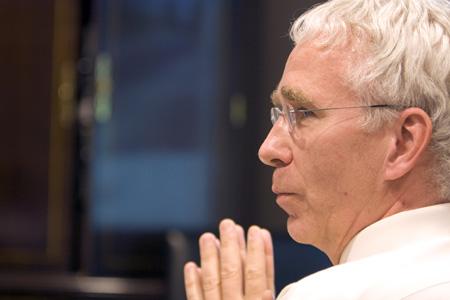Representatives from Transportation, the University’s student centers and Student Legal Services laid down their cases for increased fees Thursday at the Fee Review Committee’s third meeting.
The three groups were the first to present to the committee, which over the next seven days will hear from a total of seven groups requesting fee increases. The committee must finalize its recommendation and submit it to Chancellor James L. Oblinger by Oct. 5.
Tom Kendig, director of Transportation, explained that the increased demand for the Wolfline system, coupled with the higher costs of a new bus contract, prompted the department to request a $16 increase of the transit fee.
The proposed fee, which totals $130 a year, would create a reverse Wolflink Shuttle route and cover increased fuel costs, according to Kending. It would also pay for additional vehicles, called “tripper” buses, during peak demand periods.
“Our current system is struggling to keep up with demand,” Kendig said. “There have been several cases where students have been left behind.”
Despite the increased capacity of Transportation’s new buses — 80 passengers as opposed to 65 — Kendig said drivers estimated they leave behind an average of 600 students a week after buses fill up.
“We haven’t seen a big dropoff in that as the semester goes on,” Kendig said.
Kendig said students are left behind most often on the Wolflink Shuttle route, which serves residents of Wolf Village.
But committee member and senior in political science Laura De Castro questioned whether the fee increase would benefit Wolf Village residents more than students who don’t live in the complex.
“All students would be footing the bill for part of the student body getting tripper buses,” De Castro said.
Kendig said adding a reverse shuttle to the route would benefit students all along the route, including those who travel from east to west campus.
According to projected 2007-08 revenue figures, fees account for about 70 percent of the transit operation budget, with the remainder coming mostly from parking permits. In the 2008-09 proposed budget information submitted to the committee, transportation reduced this remainder by about $500,000, impacting its total revenues.
This drew some confusion from several committee members, who questioned why Transportation wouldn’t be able to maintain previous levels of revenue from parking permits in the future.
But Ronnie Wright, Transportation’s assistant director for finance, said this reduction was an effort to bring revenue sources back in line with the department’s goal, which specifies that 80 percent of total revenue should come from fees with the remaining 20 percent from parking permits.
“This system is there to serve the students,” Wright said “We won’t continue to raise parking prices to fund Transportation.”
Kendig specified that this fee increase wouldn’t solve all of Transportation’s budget problems, though.
“I’m not saying this is the total answer,” Kendig said. “We will still have other areas of concern, but this will go a long way.”
Evelyn Reiman and Alex Miller, associate vice chancellors for student affairs, also presented their case for a “cost of doing business” increase for the student center operations.
Student Centers President Diana Douglas prefaced their talk by informing the group that the Student Center Board of Directors voted 13 to 1 in favor of the $13.70 increase.
The proposed $206.40 fee is slated for a myriad of areas, including state legislature-mandated salary increases, new instruments and equipment for the arts units and increased costs of utilities.
Reiman said steam prices alone have increased by about 41 percent, despite stable consumption, and the drought has driven water prices up 42 percent.
Although the budget for the LGBT center will come from the student center operation’s budget, Reiman said the fee increase would not go to fund the center.
Responding to a question from Student Senate President and committee co-chair Greg Doucette, Reiman specified that after receiving extra funding from the office of the provost, she was able to free up money in the student center operations budget for the center.
In an interiew after the meeting, Reiman said even if the fee for the student center operations wasn’t increased, she would not shift money allocated to the LGBT center.
“I wouldn’t reallocate it in any way that would compromise our LGBT center,” Reiman said. “I’m very much behind our LGBT center.”
Student Legal Services Director Pam Gerace also spoke to the committee to justify her request for a $1 fee increase.
She said the nonprofit organization, which soley benefits students, has handled about 1,200 cases so far this year, including 30 to 40 cases stemming from Recording Industry Association of America lawsuits.
The proposed fee, which would be $10 a year, would fund personnel costs.








